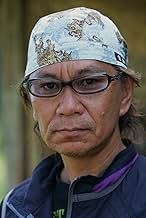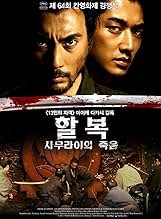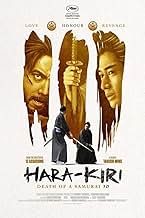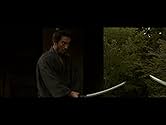IMDb RATING
7.3/10
9.8K
YOUR RATING
A tale of revenge, honor and disgrace, centering on a poverty-stricken samurai who discovers the fate of his ronin son-in-law, setting in motion a tense showdown of vengeance against the hou... Read allA tale of revenge, honor and disgrace, centering on a poverty-stricken samurai who discovers the fate of his ronin son-in-law, setting in motion a tense showdown of vengeance against the house of a feudal lord.A tale of revenge, honor and disgrace, centering on a poverty-stricken samurai who discovers the fate of his ronin son-in-law, setting in motion a tense showdown of vengeance against the house of a feudal lord.
- Director
- Writers
- Stars
- Awards
- 6 nominations total
Eita Nagayama
- Motome Chijiiwa
- (as Eita)
Gorô Daimon
- Priest
- (as Goro Daimon)
- Director
- Writers
- All cast & crew
- Production, box office & more at IMDbPro
Featured reviews
This is the film about life and how hard it can be. What a true warrior should aim for and what does it mean to be a man of action. Very interesting film with an exceptional rhythm of story telling. At first flow of the film looked too slow for me, but after warming up I did truly enjoy it. As I got very sharp emotional feelings form this very melodramatic remake of Original Harakiri (1962), at the and of the film I've got a special gift, something which will be an interesting suggestion for life and a different angle of view for it.
Anyone with a more than passing interest in Japanese movies ought to watch Kobayashi's 1962 version of Takaiguchi's novel that this also is based on, and watch the intro by the Japanese film authority Donald Ritchie on the Criterion edition. Ritchie makes fully clear how Kobayashi here, as in other films, is talking through the historical tale about current issues he was passionate about, in this case lingering post-WWII authoritarianism in Japan and hollow bureaucracies, in his day as in the time of the early Tokugawa government; Miike doesn't seem to have anything particularly urgent to say. Look at what Ritchie points out that Kobayashi's version offers: the script by ace screenwriter Shinobu Hashimoto who wrote Akira Kurosawa's Seven Samurai; the score by bold, influential experimentalist Toru Takemitsu; the strong and unifying symbolic use of empty samurai armor throughout; the career-defining lead performance by Tatsuya Nakadai; and the elegantly austere use of black and white cinematography.
Ironically Miike's film also carries over Kobayashi's one serious flaw - - an overindulgence in sentimentality and pathos in the flashback love story.
Miike, apparently seeking 'respectability' after all his entertaining ultra-violence with this staid remake/adaptation, also overdoes everything. He makes every scene too drawn-out and talky. He further overdoes the sentimentality, to the point that in his version becomes unbearably cloying, virtually unwatchable. Once again, 3D adds nothing; black and white was just what was needed. Less was and is more.
Whenever a filmmaker goes over familiar ground, adapting a book that has been adapted (and very well) before, he exposes himself to comparisons to the book and to the previous adaptation. Don't get me wrong. Miike has plenty of skill. It is not that his 'Hara- Kiri' is a washout. It's just that Kobayashi's version is a true work of art, a film classic, in fact; and in comparison Miike's is merely a competent effort and a pointless bid for respectability that was not needed. He is a master in his own realm. Surprisingly his last film before this, the juicy, action-historical blockbuster 13 Assassins, which I thoroughly enjoyed, also was an adaptation -- of Eiichi Kudo's little known samurai film of the same name. Thanks to 'Wildgrounds' (who compare the two Hara- Kiri films) for this info. Thanks also to Ben Parker on 'CapitalNewYork' for his detailed comparison of the two films; and to the Criterion Collection, for its print of Kobayashi's 'Hara-Kiri' and Donald Ritchie's informed introduction to it.
Ironically Miike's film also carries over Kobayashi's one serious flaw - - an overindulgence in sentimentality and pathos in the flashback love story.
Miike, apparently seeking 'respectability' after all his entertaining ultra-violence with this staid remake/adaptation, also overdoes everything. He makes every scene too drawn-out and talky. He further overdoes the sentimentality, to the point that in his version becomes unbearably cloying, virtually unwatchable. Once again, 3D adds nothing; black and white was just what was needed. Less was and is more.
Whenever a filmmaker goes over familiar ground, adapting a book that has been adapted (and very well) before, he exposes himself to comparisons to the book and to the previous adaptation. Don't get me wrong. Miike has plenty of skill. It is not that his 'Hara- Kiri' is a washout. It's just that Kobayashi's version is a true work of art, a film classic, in fact; and in comparison Miike's is merely a competent effort and a pointless bid for respectability that was not needed. He is a master in his own realm. Surprisingly his last film before this, the juicy, action-historical blockbuster 13 Assassins, which I thoroughly enjoyed, also was an adaptation -- of Eiichi Kudo's little known samurai film of the same name. Thanks to 'Wildgrounds' (who compare the two Hara- Kiri films) for this info. Thanks also to Ben Parker on 'CapitalNewYork' for his detailed comparison of the two films; and to the Criterion Collection, for its print of Kobayashi's 'Hara-Kiri' and Donald Ritchie's informed introduction to it.
Takashi returns to the samurai world after the success of '13 assassins' in 2011. This movie was a remake of 1962 'Harakiri' which was also a massive hit movie. I have not seen the original but this movie blown me away. As usual the story opens slow and hard to identify the situation of the story but at the right middle of the movie the flashback strikes with awesome drama about poverty and family sentiment. Once the flashback was told you will easily say where the movie is heading. The story was classic and the movie was presented with rich cinematography. The first digital 3D movie for Takashi Miike as well the first 3D movie to premier at 2011 Cannes film festival.
You have to learn a word to understand the movie completely. 'Seppuku' - which means ritual suicide committed by a samurai. So that is why it's called 'Hara-kiri: death of a samurai'. You must have patience during opening sequences, without character and story development you will be in a tough position to understand about what's going on. While the story and character progress with the development you will start to get and you may fall for the emotion parts if you are a tenderhearted. And also you will be uncomfortable during 'seppuku' scene.
Takashi Miike's career best, this is what already everyone saying about it. But Its to hard to say which was his best, I like many of his works. I might be overwhelmed by the watch but will be happy to recommend it to others. I was very little unhappy for the ending scene otherwise I could have said it is the best of Takashi's work.
I am so curious about Takashi Miike's upcoming and Hollywood debutante project 'The outside' with Tom Hardy. Expecting it would be another 'The last samurai', I wish a good luck to the team.
You have to learn a word to understand the movie completely. 'Seppuku' - which means ritual suicide committed by a samurai. So that is why it's called 'Hara-kiri: death of a samurai'. You must have patience during opening sequences, without character and story development you will be in a tough position to understand about what's going on. While the story and character progress with the development you will start to get and you may fall for the emotion parts if you are a tenderhearted. And also you will be uncomfortable during 'seppuku' scene.
Takashi Miike's career best, this is what already everyone saying about it. But Its to hard to say which was his best, I like many of his works. I might be overwhelmed by the watch but will be happy to recommend it to others. I was very little unhappy for the ending scene otherwise I could have said it is the best of Takashi's work.
I am so curious about Takashi Miike's upcoming and Hollywood debutante project 'The outside' with Tom Hardy. Expecting it would be another 'The last samurai', I wish a good luck to the team.
The Japanese cinema used to be much more powerful in the past. This remake of classic masterpiece Harakiri is far worse in many ways. It toned down criticism of authority, that is the core of the original movie. The central story is overdrawn, and it does not bring much new. What is new in this presentation is almost always at a loss, spare a somewhat simpler structure. Acting is also better in the original. But what is most annoying, is that some key subtle points are missing in this version, almost as if they were not understood, or worse yet, almost if hypocrisy of the authorities is to be whitewashed. It is far less powerful rendering of the story, it lacks authenticity that Kobayashi had with his then contemporary comments. By all means, if you can, see the original first. One of the least justified and worst remakes. However, when the original is so great, this lazy if not outright stupid remake still leaves us with a somewhat shabby but not too bad a movie. It is a disappointment coming from a director that had better days, and especially from a cinematography that seems to have grown tired, and has been surpassed by South Korea but also China to an extent.
It's a good film. I didn't see the original and so I wasn't tainted by how they compare, or the book either. It probably made this film a little hard to understand because the chronology jumps around and there are a lot of flashbacks - but I stuck with it and it did begin to make sense. The movie is a basically a tragedy that also dissects the samurai code and provides some thought provoking material to consider. The movie is reasonably well paced and for a Japanophile the set design and costumes are very well done. I don't know if Japan was that squeaky clean and tidy 400 years ago, but it seemed well considered and accurate. The movie was a little slow but portrayed a sort of Zen tranquility, so it worked for the mood or atmosphere. You could pick apart this movie, and it may not stand up to the original but if you're a fan of Japanese cinema it's definitely worth seeing.
Did you know
- TriviaThe first 3D title ever to be shown in official selection at the Cannes Film Festival.
- GoofsAs the wooden wakizashi is pushed into the stomach (after the tip snapped off), you can see that the blade is sliding into the handle.
- Quotes
Hanshirô Tsugumo: A warrior's honor is not something simply worn for show!
- ConnectionsFeatured in At the Movies: Cannes Film Festival 2011 (2011)
- How long is Hara-Kiri: Death of a Samurai?Powered by Alexa
Details
- Release date
- Countries of origin
- Official sites
- Language
- Also known as
- Cái Chết Của Võ Sĩ Đạo
- Production companies
- See more company credits at IMDbPro
Box office
- Gross US & Canada
- $75,688
- Opening weekend US & Canada
- $10,920
- Jul 22, 2012
- Gross worldwide
- $5,435,358
- Runtime
- 2h 8m(128 min)
- Color
- Sound mix
- Aspect ratio
- 2.35 : 1
Contribute to this page
Suggest an edit or add missing content































